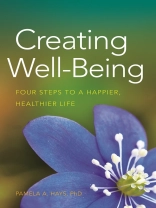Creating Well-Being presents scientifically-supported guidance for people who want to replace stress and painful emotions with a sense of well-being and contentment.
With empathy and unfailing good humor, Dr. Pamela Hays outlines a four-step process that has proven successful in her professional clinical psychology practice as well as in her own life. She invites readers to step onto the path of well-being by recognizing their stressors, avoiding negative thought-traps, re-examining their thinking, and taking action wherever possible, using environmental change, better communication skills, social support, and self-care.
Each chapter demonstrates how taking small, manageable steps adds up, over time, to real and permanent change. Packed with tips and tools for self-reflection and behavioral change, this book shows readers how to build well-being from the ground up.
Inhaltsverzeichnis
Acknowledgments
Introduction
Step 1: Stepping Onto the Path of Well-Being
Chapter 1: Finding Your Path
Chapter 2: Tapping Your Hidden Strengths
Step 2: Understanding Your Stressors
Chapter 3: How Stress Hurts
Chapter 4: The Mind–Body Connection
Chapter 5: Distinguishing Internal From External Sources of Stress
Step 3: Using Thoughts to Feel Better
Chapter 6: Thought Traps That Can Block Your Path
Chapter 7: Countering Negative Thinking
Chapter 8: Compassion Voice
Chapter 9: Well-Being Boosters
Step 4: Taking Action
Chapter 10: The Power of Thought and Action
Chapter 11: Create a Healthy Environment
Chapter 12: Learn and Practice Well-Being Behavior
Chapter 13: Assertiveness, Conflict Resolution, and Other Communication Skills
Chapter 14: Social Engagement, Meaning, and Purpose
Chapter 15: Self-Care for Staying on the Happy, Healthy Path
Afterword
References
Index
About the Author
Über den Autor
Pamela A. Hays, Ph D, is the author of
Addressing Cultural Complexities in Practice: Assessment, Diagnosis, and Therapy, and
Connecting Across Cultures: The Helper’s Toolkit. She is coeditor of the book
Culturally Responsive Cognitive—Behavioral Therapy. She holds a doctorate in clinical psychology from the University of Hawaii and from 1987 to 1988 served as a National Institute of Mental Health postdoctoral fellow at the University of Rochester School of Medicine. From 1989 to 2000, she worked as a core faculty member of the graduate psychology program at Antioch University Seattle, where she continues to teach once a year as adjunct. Dr. Hays’s research has included work with Vietnamese, Lao, and Cambodian people living in the United States and with Arab Muslim women living in North Africa. Since 2000, she has been back in her hometown of Soldotna, Alaska, working in private practice and as a supervisor for the Kenaitze Tribe’s Nakenu Family Center in Kenai, Alaska.












